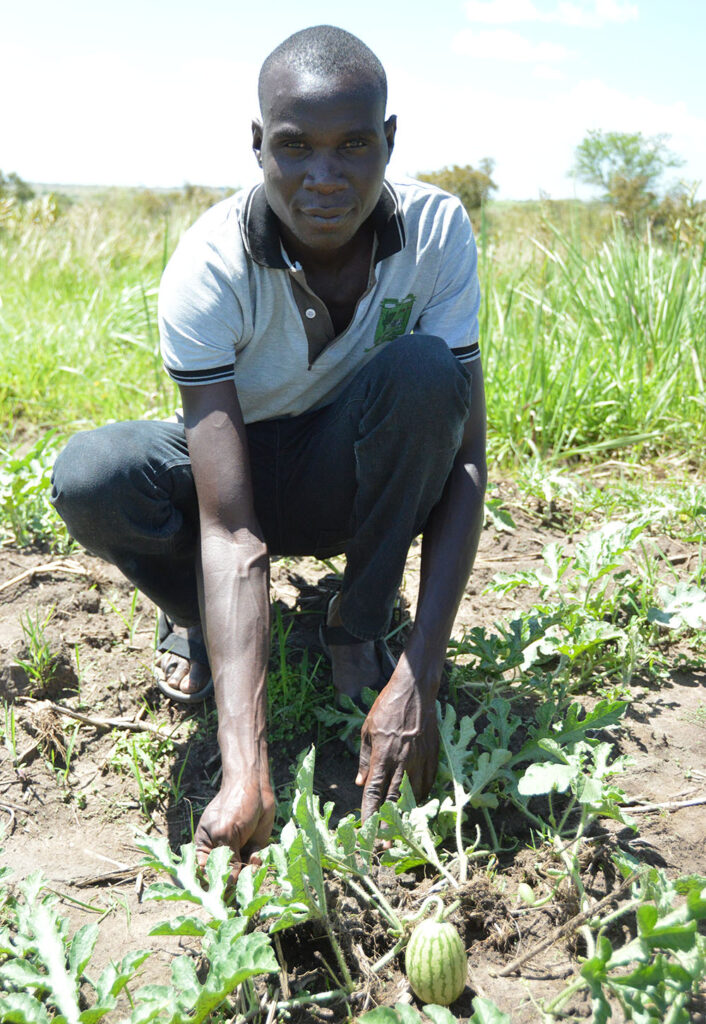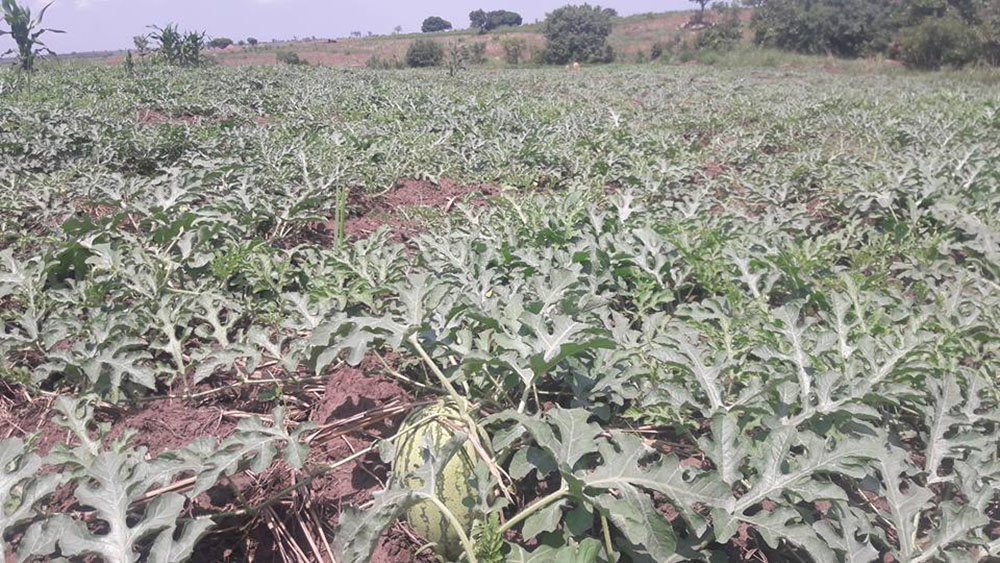In the afternoon sunshine, Denis Komakech supervises tractor works at a section of his land in Nwoya district. The land is due for planting with tomatoes and watermelon. For this primary school teacher, this is far from what his colleagues and other people think about.
“I was exposed to farming at a very early age,” says 35-year old Komakech.
“I was introduced to farming by my father, the late Charles Ojara Aguma when still in Primary Five. At the age of 13 in 1998, I could ably grow vegetables at home. In early 2001, I started selling okra to pay my school fees,” says Komakech, currently teaching at Nwoya Primary School.
Teaching profession
Komakech qualified as a Grade III teacher from Awich Primary Teachers College. On completion of his course, he relocated to Anaka town council from Purongo his ancestral home because of a job offer at Corner Nwoya Primary School.
“On realising the importance of agriculture, I joined a holiday programme at Bukalasa Agricultural College for a diploma in crop production and management. After completing my studies, I figured out that I would start farming in addition to teaching,” he says.
Komakech started his real farming enterprise with rice growing in 2009. “I started by planting rice on nine acres in our home in Purongo. I spent sh2.9m altogether to start this project. I chose rice because there was a high demand and our land is ideal for growing rice. There is also a ready market in the neighboring countries like South Sudan, DR Congo and in Kampala,” he explains.
During the first harvest, Komakech got 89 bags of unshelled rice.
“I sold it and got sh6m,” he says. He continued growing rice in the subsequent years, but changed when yields started reducing.
Komakech then started engaging in growing tomatoes and watermelon in October 2015. To ensure maximum yield, Komakech practices simple irrigation. He uses water pump and sprinkler. He spent sh2.6m on the system.
Growing vegetables
Since switching to horticulture in October 2015, Komakech has planted every season. He has tomatoes on a three-acre portion of the land at the moment,” he says. While he had grown rice on his ancestral home, he decided to hire new land for the vegetables because he thought that the other land was exhausted. He pays sh200,000 per acre every year.
Komakech grows tomatoes and watermelon on four acres of land. Joshua, in the para above, he says he grows tomatoes on three acres. Then now we are saying grows watermelon and tomatoes on four acres. Which is which? For a while, he was undecided whether he will succeed because of his busy teaching schedule, however he divided his time properly. He dedicates early morning hours between 6-7am to the farm, then uses the day at school, before returning to the farm after 5pm.
He took advantage of the prolonged drought to plant tomatoes and watermelon, which take three months to mature with the ready market from restaurants and other food venders in Gulu, Nwoya, Amuru, Kitgum, Pader, Nebbi, Yumbe, Arua, Kampala and South Sudan. “When I carried out a case study on vegetables, I realized that prices are much higher during the dry season and so I dug a water source near my farm so that I plant throughout the year,” he says.
Cost of starting up his farm
At the beginning, Komakech hired four acres of land at a cost of sh200,000. He used sh640,000 in ploughing his four acres of land with a tractor. “I use the tractor because it digs deeper into the soils,” he says.
Komakech bought four tins of Nuru F1 tomato seeds which are drought resistant at sh1.2m for three acres and watermelon seeds at sh250,000 for his one acre. Planting cost him sh60,000 per acre. Both tomatoes and watermelon seeds are high yielding and mature within three months.
“I plant hybrids because they produce much more than other ordinary seeds,” he says.
Preparing garden
After preparing the garden, Komakech and his wife, mother and workers dug holes of about 40-45cm for each tomato plant and watermelon seed.
“Before planting the tomatoes and watermelon seeds, I apply both organic and inorganic fertiliser like Vigimax, Green Miracle and Easy Grow which have NPK plus all wind gold and DAP in each hole,” he says. On average, each hole takes around 50mg of the fertilisers.
Joseph Gombya, an agronomist working with Nsanja Agro-chemicals, says tomatoes have low water demands. The watermelons need a long growing season of up to 75 to 80 days, depending on the type one is planting.
“I have good soils which are suitable for the seeds to germinate. I sow the seeds one inch deep and keep watering them until they germinate. Then I begin harvesting after 75-80 days when they are ready,” Komakech explains.
“I can plant at any one time of the year because I have a water source and equipment to irrigate the crops,” he says.
Diseases
Komakech says crop diseases and pests are a menace, especially soil-borne fungal diseases and pests such as caterpillars. “I get rid of them using fungicide called Diathen and fangocil plus other pesticides/nematocide like Duduguard, Duduethoat and Tafgro,” he says. The watermelon are relatively resistant to pests, although he also applies protective pesticides to keep them safe.
“With time, I realized that tomato plants need to be taken care of each day for proper management of pests,” he says. In his absence, the workers do the farm work.
Workforce
Komakech employs four workers from the community. He also sells produce to people in the community at relatively low prices. He pays workers sh180,000 each per month and provides them food.
Managing drought
Komakech set up his farm adjacent to a water source, so that he can irrigate when need arises. He bought both the pump and the water gun at sh2.6m.
“Nuru F1 tomatoes are resistant to drought. I plant them, well aware of seasons when crops such as tomato and watermelon are on demand, so I plant targeting the dry seasons when there is ready market,” he says.
“I use grass to mulch the gardens to protect from sub heat and help in manure,” Komakech explains.
Part 2
Part 2: Since switching to horticulture in October 2015, Denis Komakech has planted every season. He grows tomatoes, watermelon and rice…
Earnings and expenses
“I make as much as sh10m every after five months from tomatoes,” Komakech says. There are two harvests per year, which means that he earns at least sh20m per year.
Additionally, he makes sh15m per year from the watermelon. From these earnings, he pays sh720,000 in total to four of the workers at the farm. This adds up to sh8.6m per year. He also spends at least sh2.4m on tomato seeds per year and sh250,000 on watermelon seeds. To run the water pump, he spends around sh2m on fuel per year.
He spends sh400,000 on hiring the land and around sh1m on buying fertilizers and pesticides.
Challenges
“My biggest challenge is lack transport to carry my product to the market and I have resorted to sell them from the gardens” Komakech says.
He says due to lack of transport, middlemen dictate the prices, cutting into his profit margins.
Komakech’s crops, especially the tomatoes, bore the brunt of the heat wave that hit the Acholi sub-region.
He spends lot of money buying fuel to run the water pump where in a day he uses six litres of petrol at sh21,900.
Environmental protection
Komakech says to preserve environment, he is not cutting trees in the farm and leaving some grasses along the water source for aquatic animals.
“I plan to plant more trees as ways of protecting the environment and respecting nature as to fight climate change,” he explains.
Keeping records
Komakech says it is important to keep records.
“Records help us farmers to know the daily activity in the farm and how much profit one is making out of his farming,” he says.
Achievements
With the diploma he got in crop production and management, Komakech says he intends to set up poultry farm layer birds to supply eggs which have ready market in the north.
Though he has married with children, Komakech says he has been able to provide for his parents in Purongo and other relatives financial support where he also opened up a shop in Anaka town council.


Family involvement
Komakech’s wife, Linda Proscovia Amony, also a primary school teacher, says she helps her husband on the farm.
“I work together with my husband. I help him with planting tomatoes and watermelon and spraying. I also carry out harvests. I love working together as a family with my husband for the future of our children,” Amony says.
Amony adds: “Farming needs a plan as a family to budget together so that each one of you knows which role to play for the work to become easy and share the idea together on how it will work out successfully.”
She advises other women to help their husbands when it comes to farming. She says farming is helping them pay school fees, cater for their needs and support other relatives.





